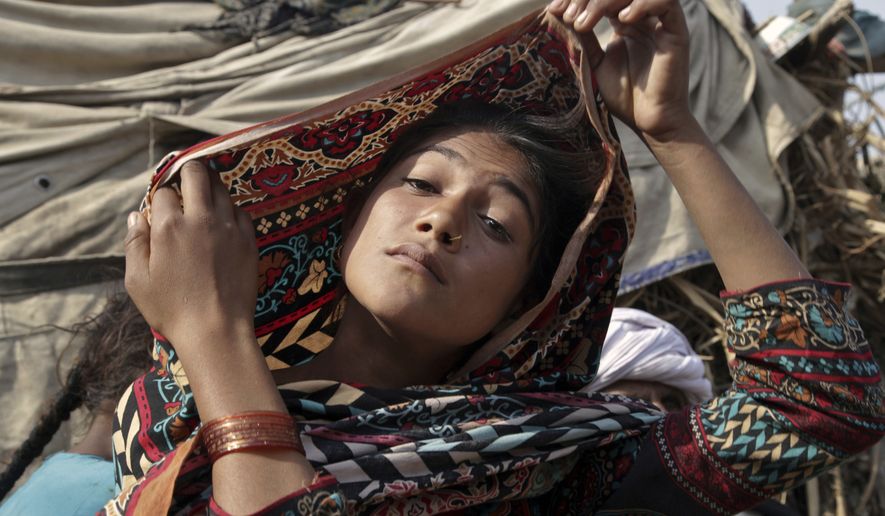LAHORE, Pakistan — Hameeda, 15, was married to Saqib, 30, in a small ceremony in a small village in the Khyber Pakhtunkhwa region of northern Pakistan.
Hameeda, who had only recently stopped playing house with her dolls, is now running a household of her own and is on her way to becoming a mother.
“My husband works as a driver in United Arab Emirates while I stay in the village with my in-laws. He visits during Eid holidays only,” she said, referring to annual Muslim holidays that follow the fasting month of Ramadan.
“One day I will also visit him by taking an airplane,” she said as her face lit up.
Hameeda is one of more than 1 million child brides in Pakistan despite laws meant to make it illegal for girls to marry before age 16. A bill in Parliament would raise the minimum age to 18, but it faces opposition by religious conservatives. This time, however, child advocates say something has to be done.
“Child marriage is one of the worst human rights violations,” said Samar Minallah Khan, an independent anthropologist and child rights advocate based in Islamabad. “It puts an end to a child’s right to freedom, education and to play. It takes away their childhood. They cannot be children anymore.”
With an estimated 1,909,000 children currently married, Pakistan has the sixth-highest rate of child marriage in the world, according to UNICEF.
The problems are not just cultural. The U.N. World Health Organization notes that the leading causes of death for females ages 15 to 19 are linked to pregnancy and childbirth. Babies born to girls younger than 18 are at higher risks of death and poor development, the WHO report said.
About 650 million girls and women alive today were married before age 18 — roughly 17% of the world’s female population, according to UNICEF.
In Pakistan, 21% of girls are married off before their 18th birthday, including 3% before age 15.
Most child brides marry men three to four times older.
“Parents want to get rid of their young girls as soon as they reach puberty. The mindset is that they are considered to be a burden,” said Rubina Saigol, a child advocate in Lahore. After the marriage, “the girl is property of another home and belongs there — and therefore has to be taken care of there.”
“It is rooted in economic reasons, with this idea is the girl is only an entity, not a human being with any human or property rights,” she said. “The son, however, is considered the breadwinner.”
Last month, a 7-year-old girl was given in marriage to a 28-year-old man in a village in Punjab in central Pakistan. The police raided the ceremony and arrested the bridegroom. In June, a 60-year-old man was arrested as he was about to marry a 12-year-old girl in Sadiqabad in southern Pakistan. A 45-year-old man married a 10-year-old girl in Sindh in southern Pakistan in May. He was arrested.
Stalemate
Pakistani law sets the minimum marriage age at 16 for girls and 18 for boys. Activists say the age must be raised and the law better enforced. Pakistan is also a signatory to international agreements such as the Convention on the Rights of the Child that require enforcement of laws to prevent child marriage.
In May, the ruling party Pakistan Tehreek-e-Insaf party introduced a bill in the legislature to amend the Child Marriage Restraint Act of 1929 to set the marriageable age for girls at 18. It would impose a fine and possible imprisonment for the groom and those involved in facilitating the marriage, including parents, marriage brokers and the religious authorities who marry the couple.
Pakistan’s National Assembly Standing Committee on Law and Justice last week rejected such legislation. Opponents said it violated religious tenets.
“I will never support any legislation that is against the tenets of Islam,” said Ali Muhammad Khan, minister of state for parliamentary affairs. “Pakistan is an Islamic country, and no such law can be passed here even if it costs me my ministry or my seat [in Parliament].”
Qibla Ayaz, chairman of Pakistan’s Council of Islamic Ideology, said, “In 1961, the minimum age for marriage was set to 16, which was un-Islamic. It will be going again against the Shariah [Islamic law] if the age of marriage is changed to 18.”
As it has with all other attempts to amend the marriageable age for girls, the council warned that any legislation to ban child marriage would lead to “complications.” It asked instead for an awareness campaign to discourage the practice.
Officials advocating a change expressed disappointment.
“What hopes can one really attribute to a society [where] 50 elected representatives and even ministers actually voted for underage marriage? Should be enough to give sleepless [nights],” said a tweet by Fawad Chaudhry, minister of science and technology.
Activists say the issue has never been a priority and that the government of Prime Minister Imran Khan pays only lip service to it.
The Khan government “is an extremely conservative, right-wing one. They have no interest or will to do anything in issues like child marriages,” said Ms. Saigol. “They are focused on other things, and this is not a priority for them. Every other day we hear of underage girls being married or Hindu girls’ abduction [for marriage], but it doesn’t bother the government much.”
Hameeda, meanwhile, waits for her child to be born. She said her biggest problem is that she doesn’t have that much to do and being in her second trimester is limiting. She said she once hoped to be a schoolteacher for girls in her village. Marriage ended that dream.
“I would have made a difference for my community,” she said.
Now, she said, the child will at least reduce her boredom.
“Since my husband is away most of the time, I feel my child will be a good distraction for me,” she said.




Please read our comment policy before commenting.